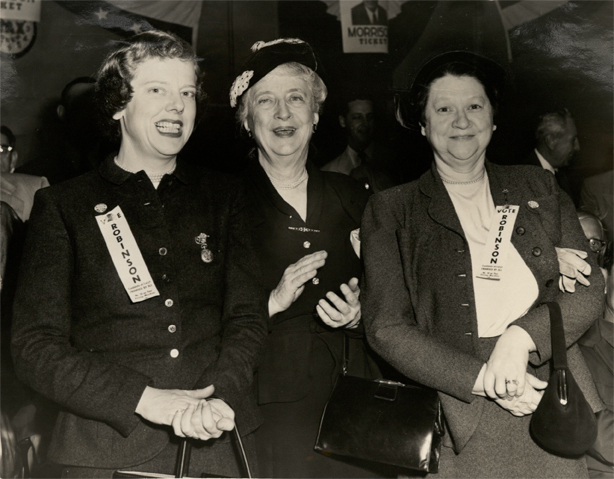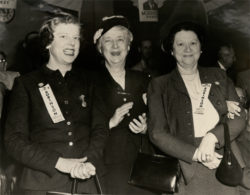Independent Women’s Organization
The Independent Women's Organization became identified with good government due to its in-depth study of political issues, unbiased endorsements, and political action.

Courtesy of Louisiana Research Collection at Tulane University Library.
A reproduction of a photograph of members of The Independent Women's Organization With Martha Gilmore Robinson in 1954.
Formed during the late 1930s and early 1940s, the Independent Women’s Organization (IWO) consisted of Louisiana women anxious to eliminate government corruption. Initially organized to support the anti-Long gubernatorial candidate, Sam Houston Jones, the group went on to advocate issues such as public integration and governmental reform. The IWO’s tough screening of political candidates became well known and the group’s political endorsements highly valued. Though the group’s members dwindle and its influence diminished by the 1990s, the IWO played an important role in mid-twentieth century Louisiana politics.
The roots of the Independent Women’s Organization reach back to 1939, when federal indictments stung many of Huey P. Long’s political successors. The anti-Long element looked eagerly to the gubernatorial contest of 1940. In New Orleans, they enlisted women to canvass for Sam Houston Jones, their candidate. Many women of the comfortable classes responded with alacrity, canvassing to identify fraudulently registered voters and, later, serving as poll watchers. The press gave women considerable credit when Jones defeated Earl Long. But, although hundreds participated in the effort, the group did not last beyond the election. In fact, the women hadn’t even thought to give their organization a name.
When New Orleans elected a mayor in 1946, however, the same women turned out in full force to support deLesseps Morrison. Tagging the incumbent Robert Maestri as corrupt and ineffective, they christened themselves the Independent Women’s Organization and devoted hours of unpaid labor to promote their candidate. They registered more than four thousand new women voters and staged a giant “march of brooms” down Canal Street. As they marched, the women shouldered household brooms to symbolize their slogan, “a clean sweep with Morrison.” Wearing the broom became synonymous with opposing machine politics and backing reformers. When the challenger defeated the incumbent by slightly more than four thousand votes (out of 133,000 cast), many observers credited the IWO’s efforts.
Convinced they could exercise a positive influence on city affairs, the IWO became a permanent body in 1946. With a membership of approximately one thousand, it met only four times annually, leaving a twelve-woman board of governors to speak for the group. The elected inner circle met at least monthly, frequently more often, to study issues and discuss actions. Because of the issues it backed, the IWO became strongly identified in the public mind with good government. Reforming public education took priority in the 1950s. In the 1960s, the originally all-white group welcomed its first black members.
The IWO was known for trademark sessions during which members grilled candidates before deciding who to endorse. These meetings consistently attracted overflow crowds, and the IWO endorsement continued to be sought by all. The organization prided itself on never taking money from candidates; its endorsement and labor were free, earned by a candidate’s positions, not his cash.
IWO membership declined in the late twentieth century. Changes in women’s roles meant fewer women had time to devote to nonpaid political work. The rise of the southern Republican Party eroded the IWO as well, since IWO bylaws stipulated members must be “registered Democratic.” As black political organizations grappled for control of New Orleans politics, they often tried to pad the IWO with women who would advocate for their candidates. As a result, the IWO became factionalized and politicized. Year by year membership shrank, falling to only sixty-four by the mid-1990s. The group ceased operations for five years following Hurricane Katrina, but was reformed by activists Felicia Kahn and Gail Broussard, who rebuilt the IWO into a now-thriving organization with more than three hundred members. To this day, the IWO holds an honored place in New Orleans political history as an early and effective force for change.
